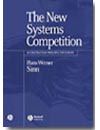On the German Autobahn communism still prevails. The limited space belongs to all motorists, and this is not rationed by means of a price mechanism but by the willingness to wait out the traffic jams. With the introduction of road tolls the scarce road space and the allocation to rivalling economic uses can be auctioned without creating traffic jams. Well-designed road tolls, staggered according to times of day and congested routes, lead to a considerably better selection of means of transport than can be expected from the self-regulation of traffic via traffic jams. Transports that supply the highest economic benefit will prevail over other transports of lesser importance. Many transports will be shifted to times of day with less traffic volume and some transports will not take place at all since it will prove more economical to intensify local supply chains instead of directing transports back and forth throughout Europe. This will improve the efficiency of the European economy in the same way as the transition from a communist command economy to a market economy did. Germany has introduced a road toll system for trucks on the Autobahn. These fees could be graduated according to individual stretches and times of day and be extended to other highways. In addition, the toll could also be extended to include automobiles.
Refereed scientific monographs
 The New Systems Competition, Yrjö Jahnsson Lectures, Basil Blackwell: Oxford 2003, 228 pages. One hardback, one paperback edition. To Amazon.
The New Systems Competition, Yrjö Jahnsson Lectures, Basil Blackwell: Oxford 2003, 228 pages. One hardback, one paperback edition. To Amazon.
Ifo Viewpoints
Ifo Viewpoint No. 146: The Case for Car Tolls, May 8, 2013.
Ifo Viewpoint No. 117: Tolls Instead of Traffic Jams, Sep 15, 2010.
Ifo Viewpoint No. 48: Hands off the Mileage Allowance!, Oct 2, 2003.
Ifo Viewpoint No. 44: Putting a Stop to Autobahn Communism, Mar 18, 2003.